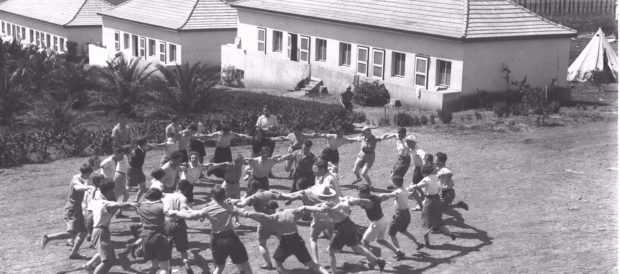Is Hong Kong a Commune?
Is Hong Kong a Commune? / 2018-08-28 / Nick Sallnow-Smith
Last month I posed the question, is Hong Kong a Corporation? Should the Government think of the city as a business to be run? Of course my answer was ”no”, even though many of our citizens seem to believe otherwise. Perversely, many of those same people seem simultaneously to suggest Hong Kong should be thought of as a commune, which I define to mean “a group of people living together and sharing possessions and responsibilities”. The root of the word is the same as that of communism. But I shall not use that word here because of it’s “one party state” connotation, which I do not have in mind. I am thinking of “commune-ism” not communism.
Probably the best example of commune-ism at work is the kibbutz of Israel. This way of life perhaps comes closest to the Marxist slogan “from each according to his ability to each according to his needs”. In a Kibbutz there is no private property, not even clothes. Work is allocated. Everything shared. The idea seems quite consistent with the present day “progressive” desire for equality. Of course the decisions on how work is allocated, what is produced, how what is produced is shared, need to be made by a committee (unless the group is very small).
Kibbutzim long predated the state of Israel, but their existence there is of interest because it tests how attractive people actually find this apparently “utopian” living arrangement. Unlike totalitarian states where commune-like structures are imposed, in kibbutzim anyone can join and anyone can leave. Its attractiveness, once it has been experienced, is quite well illustrated in Israel. Having peaked in the 1980’s below 10%, perhaps 2% of the population choose to live there today.
My purpose here is not to analyse why what some seem to argue would be an ideal way to live, is not popular in practice but to look at some public policy areas in Hong Kong which directly reflect the commune idea.
Consider public housing: about half of Hong Kong households live in public units (PRH or HOS). These are designed and built by government. They are allocated by bureaucrats, according to Government imposed criteria, not by personal choice. Size, design, location and pricing are all decided by others, not the tenants. This is consistent with commune-ism. A committee of the collective would decide where everyone slept, what property should be built, what food would be grown etc.
One might have thought that most of the Hong Kong population would want to minimise the extent of this type of housing arrangement, where citizens have no individual choice but are “allocated” a dwelling by the state. But no, many arguing for reform of housing policy want more of this type of housing, not less. Instead of 50% they argue for over 60%, even 80% of households to be allocated state units!
Let’s turn to education. In our typical commune all the kids would be taught the same curriculum in the same way. No choice would be given. One might expect that in our free market city citizens would be pushing for more choice; the chance to choose how their children are taught, what they are taught and where they are taught it. But no, there are many arguments about what should be taught (think national education, liberal studies) but precious few about whether this should be done in Government schools in the “one size fits all” way of the commune.
Health care shows a similar pattern. There is overwhelming public preference for a system where all are “allocated” care by a Government-run collective, where personal choice is largely absent. The small private sector where choice of doctor, of location, of type of medical care is available is criticised by many for its perceived “unfairness” to those with insufficient means. What is regularly missed is that medical resources will always need to be allocated. The question is, by what method? By patient choice and pricing? Or by queuing and bureaucratic triage? To conclude that the second approach is “fair” while the first is not, is curious. Perhaps the first system is believed to be one where all are equally badly treated. And in order to be equally badly treated, no customer choice can be allowed. This seems to be the modern progressive trade-off. I will give up my chance to choose, provided everyone else loses their right to choose as well.
The reason I give my kibbutz example is to show that in Israel when people actually have free choice between these systems, they tend to choose freedom. With our government allocating housing, education, health, and increasingly savings too (via the MPF), very few have a genuine choice. Far from resisting this state of affairs, many people beg for more government, not less. All they want is a bigger allocation for them, not more choice for all.
Yet the outcome of this lack of choice is always discontent. Very few complain about the range of restaurants in Hong Kong, all of which are operating in the private sector where consumer choice prevails. Most of the political rancour is instead seen precisely in those areas of most Government intervention and control: housing, education, and health care. It is time perhaps to realise that commune-like allocation of resources without personal choice is not a solution to the problem of scarce resources but the main obstacle to a contented community.
Let us reject the COHK meaning “Corporation of Hong Kong”, and the COHK meaning “Commune of Hong Kong”, and opt for COHK, the “Community of Hong Kong”.
Nick Sallnow-Smith
Chairman

